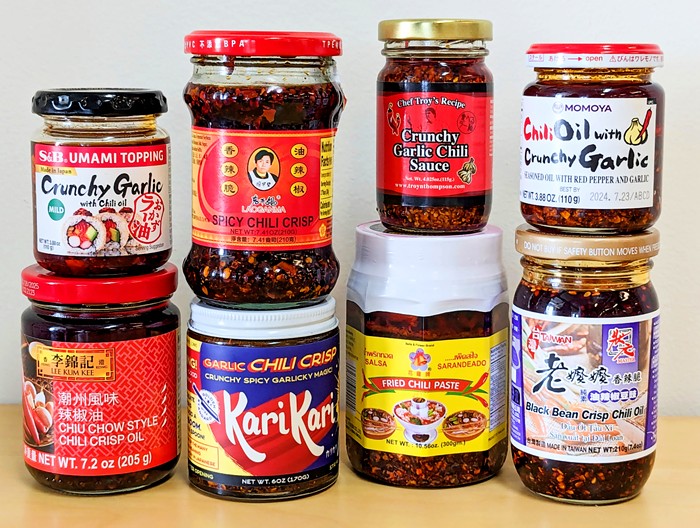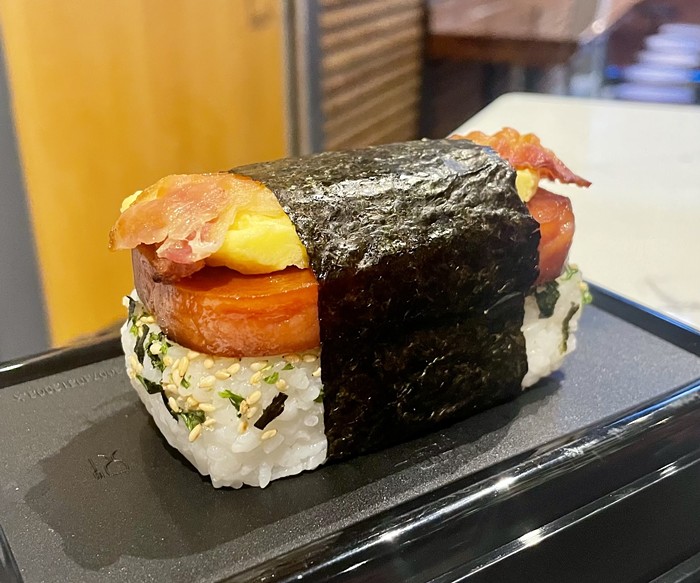No one cares that the tables are close together at the Golden Beetle, or that a gyro costs $20. Maria Hines is the chef/owner of Tilth, and this is her new Ballard place. Both of her restaurants are certified organic by super- serious Oregon Tilth (only one other, anywhere, has earned the rating); people eating here are super-serious about their food. You overhear gossip about the sudden closure of nearby 5 Corner Market, with its fancy Josper oven. Servers field questions about the pink-tinged salt on the table (Murray River salt, from Australia; Saveur calls it "delicately flaky, fruity-tasting").
An entire constellation of mosaic lanterns hangs in the Golden Beetle's interior sky—there are 32 of them, if you can trust your eyes. They glow in different sizes and designs; Hines had them imported from Turkey. The walls and trim are two colors of faraway blue, and big black-and-white photos show, for instance, a street vendor in front of Istanbul's most famous mosque (though the one of the man with a handful of beans and kind eyes is just as pretty, in a different way). In the kitchen, there's more mosaic on a wood-fired oven, but as far as decor goes, that's about that. It feels like a good cafe—lots of energy, a busy bar, with food until 1:00 a.m. on the weekends and drinks till 2:00. The bar manager came from Lola, and the cocktails require a review of their own: the Beirut Fizz, with Hendrick's and rosewater and cucumber DRY Soda; the Rainier Smash, Jim Beam, mint, Rainier beer.
So, is the Golden Beetle's Eastern Mediterranean "elevated street food" as good as the refined new American served in Tilth's tranquil Wallingford Craftsman? It's not quite the right question—is an olive as good as an apple? But to start with something simple, the Golden Beetle's yogurt dip is better than anything like it I've ever tasted. All those tzatzikis, all those dressings on all those Middle Eastern sandwiches, all those veggie dips—eh! This tastes alive: the brightest garlic, most springy sprigs of dill, tangy-fresh Greek yogurt crawling with cultures, Persian cucumbers. It's Hines's emulation of what she had in Greece last May; if $3 for a little dish of it is way more than usual, it's way less than a plane ticket.
Organic does make a difference, and so does super-fresh. The hummus is the same way—pureed super-smooth, nutty and nearly sweet, remarkably light, and barely garlicky, with extremely hot rounds of pickled serrano pepper lodged in it in case, say, your heart stops. All other hummus: so pushy, so leaden. It costs $3, too, and the house-made wood-fired pita is $4, and you'll get way more elsewhere, but it'll be nowhere as good.
It's too bad that the TWENTY-DOLLARS-FOR-A-GYRO?! crowd—the people who love these flavors but cannot abide the ascension of "street food" into the double-digits—will never darken the Golden Beetle's door. If they came and opened their wallets—just one time, maybe at the small-plates-and-wine-for-$3 happy hour—they might change their mind. Not only are the ingredients screamingly fresh and pure, so are the spices. The cumin is a different beast than the stuff that's been sitting in a giant plastic container over a hot grill; the house-made harissa is smoky, more roasty-subtle than spicy-hot. (Both are on your table, along with the special salt.) The za'atar french fries are tossed in herbs and black sesame and sumac, then double deep-fried, with the second time in beef fat (vegetarian available, but pretty much a crime). Dip them in the harissa; it makes sense that they cost $7 an order.
Eating your way through some of the "T'mazza—To savor in little bites" section of the menu is the best thing to do. The couscous ($6) is unbelievably light and fluffy and golden, made with a citrusy hint of preserved lemon; the falafel ($8) is extra-dark-brown-crunchy-crusted, tenderness itself inside. If you're a wing person, you probably shouldn't die without trying the grilled ones here ($10), which sit in a swirly sauce of ginger paste and harissa; they taste like lime and fire (and an organic wing, even under a ton of brick-red hot sauce, is still way better than a sad factory- farmed wing).
Two of the small plates this Easter time involve rabbit. First: wood-fired rabbit kidney ($10), which proves to be small cubes of the organ impaled with onion and olives and apple on two skewers: earthiness, saltiness, sweetness—best when you get them all in one bite (and the pistachio-strewn salad underneath is great, too). Second: meat pies ($10), two triangles of the lightest, butteriest-tasting puff pastry ever, filled with shreds of soft rabbit and pine nuts—I ate this while it was still too hot, ignoring its wine-flavored currant puree (which functioned nicely as a pudding afterward).
Is the $20 gyro worth it? It's probably safe to say that the pink-salt/organic-worshipping crowd will love it—it's made with (odd but delicious) turkey meat and (ditto) lamb fat and leaves of newborn romaine and pickled red onion and, for sauce, a cloud of yogurt mousse. The two other large plates I tried weren't as great as the small ones: St. Jude's albacore tuna ($22) with too much salt seared onto it and a sweetish, grainy tarator sauce; and a lamb tagine ($24) that was perfectly good but lacked intensity (as leftovers, however, with flavors melded in the fridge and via reheating, it was practically spectacular). And the kitchen isn't fail-safe: The pita was gorgeous and toasty one night, but pale and doughy another, while a perfect pilaf was reprised later unpleasantly al dente.
But send anything not-quite-right back: Maria Hines and her Golden Beetle chef de cuisine, Forrest Brunton, would really want you to (she splits her time between her two places). I met Hines once several years ago, when she was cooking a million ducks at the summer feast Burning Beast, and she is sincere and thoughtful in the extreme (even when drinking a cheap beer while sweating over a grill). I called her up to ask about Golden Beetle, and she evinced the sort of all-consuming concern you want in a chef—about the noise level, the temperature, the service (all good). The name, she said, she found leafing through a recipe book. The golden beetle—the actual insect—is an ingredient in the legendary North African spice mix ras el hanout. It's also said to be an aphrodisiac like Spanish fly. "It's kind of funny," she said, "now I've got one restaurant that's named after dirt and one that's named after a bug." ![]()



















